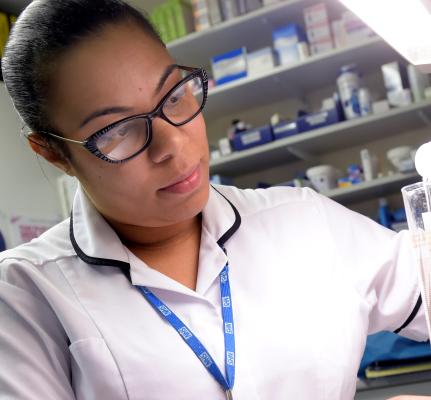Pharmacy assistant
Pharmacy assistants help pharmacists and pharmacy technicians order, prepare and dispense medicines.
Working life
A pharmacy is where medicines are stored, prepared and dispensed. Medicines are the most common treatments offered to NHS patients.
You’ll work as part of a pharmacy team under the direction of a registered pharmacist. You’ll work with patients every day and help with their prescriptions. You’ll also answer their questions, either face-to-face or over the phone.
You will make sure that the pharmacy has the necessary stock by ordering items as well as receiving, loading and unloading deliveries. If working in a hospital or health centre, you may deliver medicines to other wards or healthcare professionals.
You might also help manufacture medicine for individual patients where needed such as those needing cancer treatment.
Shannon Harris
Assistant technical officer - dispenser
Read Shannon's storyThe best bit about the job is knowing I’m helping someone get the medication they need to help them on their personal road to recovery.

Pay and benefits
If you’re working in the NHS, pharmacy assistants will usually start at band 2 or 3 of the Agenda for Change (AfC) pay scale. You’ll also have access to a generous pension scheme and health service discounts, as well as at least 27 days of annual leave plus bank holidays.
Terms and conditions can vary for pharmacy assistants outside of the NHS, including those working in community pharmacies, or for other employers that provide NHS services.
How to become a pharmacy assistant
You can apply for jobs directly for a pharmacy assistant position. Vacancies in the NHS are advertised on the NHS Jobs website.
Vacancies outside of the NHS will be advertised locally by the employer, so it you might find adverts in the local newspaper, on websites for community pharmacies and GP surgeries in your local area, in job centres and on many of the main recruitment and job websites.
You may find that some jobs are advertised as a pharmacy assistant or a level 2 pharmacy services assistant apprentice.
Entry requirements
There are no set entry requirements, but most employers will expect good literacy, numeracy, and IT skills. They may ask for GCSEs or equivalent qualification and some relevant work experience. Even where it is not specified, experience in a customer service role would be an advantage.
Must have skills
- responsible, accurate and methodical
- able to pay attention to detail
- able to read and carry out instructions
- to be interested in people’s health
- able to explain clearly to members of the public
- excellent communication, customer service, IT and manual skills.
Training and development
You’ll be given the training on the job such as health and safety, use of IT systems, manufacturing medicines and dispensing prescriptions.
You may also be offered the chance to complete the Pharmacy services assistant (level 2).
Where can a pharmacy assistant career take you
- You could undertake further training to become a pharmacy technician
- You could lead a team responsible for the receipt and delivery of medicines and medical gases in a hospital or an aseptic unit to help prepare cancer drugs
- You could become a health living champion working in a community pharmacy.




